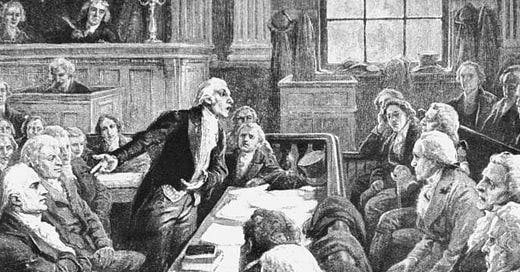The Limitations of Legal Immunity: Monarchy versus Presidency
From Kings to Presidents: The Battle Over Legal Accountability
In its 2024 decision on presidential immunity, Trump v. United States, the Supreme Court held that a former president is absolutely immune from criminal prosecution for actions within his “conclusive and preclusive” constitutional authority, entitled to at least presumptive immunity for all official acts, and entirely unprotected when it comes to unofficial conduct.
Though the decision carved out important distinctions, it revived a fundamental question as old as the Republic itself: to what extent is the president answerable to the law? That question first came to a head in 1807.
On June 17 of that year, the President of the United States, Thomas Jefferson, dispatched a letter from Washington, D.C. to Richmond, Virginia. The letter was addressed to George Hay, the United States Attorney for the District of Virginia.[1] Hay was currently serving as the prosecutor in the momentous treason trial of Jefferson’s former Vice President, Aaron Burr.
Burr was charged with a misdemeanor for allegedly planning to wage war in Spanish territory (including Mexico) and with treason for supposedly conspiring to separate Western territories from the United States. However, these charges were not as airtight as President Jefferson would have wished. And Burr was himself a shrewd lawyer, adept at courtroom maneuvers. He and his lawyers made a startling request of the presiding judge, who happened to be Chief Justice John Marshall of the United States Supreme Court (Marshall acting in his capacity as the federal judge for the United States Circuit Court for Virginia). They requested that Judge Marshall subpoena President Jefferson to personally appear before the court and deliver documents to aid Burr in his defense.
Given the youth of the American Presidency, this request was certainly unprecedented. But it was also unprecedented in the long history of the English common law tradition, to which the nascent American legal system was heir. No executive figure had ever been subpoenaed since the writ was created in the mid-fourteenth century. The reason for this was quite simple: for nearly all of English history from that time forward, the executive of England had been the monarch. The position of the monarch in English legal history is a curious one. Jurists in the thirteenth century concluded that the king was both above the law and yet below it. This legal fudge relied heavily on the notion that the king was the guarantor of the common law; therefore, he must keep it himself. However, as its guarantor, the law was his law; the courts his courts; the judges his judges. The king possessed the power of pardon in order to temper the law with mercy. And, for the purposes of this study, while the king was supposedly below the law, he was certainly not below any court of law.
The great legal historian Sir Frederic William Maitland noted that there were discussions in the second half of the thirteenth century as to whether the king should be below a court of law and liable to summons.[2] This remained a debating point for the next century: during the mid-fourteenth century, one English judge avowed that he had seen a writ beginning Praecipe Henrico regi Angliae, which summoned a King Henry (likely King Henry III) as party to a civil suit.[3] However, Maitland doubted whether this testimony was true. If it was, he suggested “it was some joke, some forgery, or possibly some relic from the Barons’ War.”[4]
The truth of the matter had been stated long before. In the same King Henry III’s reign, the great legal treatise Bracton baldly declared, “Our lord the king can not be summoned or receive a command from any one.”[5] This was recorded in a judgment in a king’s court in 1234. A decade earlier, a writ attested to by the king’s chief justiciar (senior minister) recorded in the royal “we” that “[o]ur court is not above us and can not summon nor compel us against our will.”[6] Thus was born the common law notion that the king can do no wrong.
Maitland had short shrift with that idea. A king could and did do wrong. Henry III’s father was, after all, “Bad” King John, whose tyrannous reign witnessed the advent of Magna Carta. But, and much as Maitland disliked the doctrine of two capacities, the impersonal crown embodied by the king could do no wrong. Time ran not against him as guardian and arbiter of the common law and what was just and right.
A president, however, is not a king. And even if one accepts the notion propounded by Eric Nelson in his book The Royalist Revolution[7] that the Presidency, as conceived by the Constitutional Convention, was in practice a limited monarchy, could a president be subpoenaed like any other individual to appear before an American court?
It is important to note here that Aaron Burr’s chief defense counsel was Charles Lee of Virginia (yes, that Lee family). Lee had been appointed as Attorney General of the United States by President George Washington in 1795. He continued to serve in the role under both Presidents Washington and Adams until 1801 with the election of Thomas Jefferson. During his tenure, Lee had defended presidential authority and power. President Adams asked Attorney General Lee if the president could issue a pardon to John Fries for a recent insurrection against the federal government. Lee’s response was unequivocal: “The Attorney General of the United States most respectfully reports to the President his opinion that the President may reprieve for offences against the United States in all cases except in cases of impeachment.”[8]
Now, one might say it is unsurprising that Lee had this opinion during Adams’s administration, given his connection to the Federalist government Adams headed. With Jefferson and his Republicans in power, of course, Lee would revert to a more critical position regarding presidential power. He was also a good lawyer, helping his client find the evidence needed to win the case. Yet, Lee was arguably the least partisan of all Cabinet members in the Adams administration. For him, it was law that governed. The president undoubtedly had great power, but he did not have legal immunity in all respects. If the president were a limited monarch, then here limited met monarch.
Judge John Marshall eventually decided that Burr’s request had legal weight – though it was also a chance to get one over on his cousin and rival, President Jefferson. On June 13, 1807, he issued a subpoena to President Jefferson, Secretary of the Navy Robert Smith, and Secretary of War Henry Dearborn to produce documents imperative to Burr’s defense. All three were further directed to personally appear before the court in Richmond.[9] Under the terms of a subpoena, there would be penalties, possibly imprisonment, if these men did not comply. Lee and Marshall agreed about the extent of presidential immunity, and it did not include being above a summons to a court of law.
Thomas Jefferson did not agree – surprisingly so, given his beliefs on a republican-style executive. Which brings us back to his letter of June 17, 1807. In the first paragraph, Jefferson detailed how he ordered his Cabinet secretaries to turn over some of the papers Burr requested for his defense, both originals and copies. However, in relation to his personal summons, his response was a definite “no”:
As to our personal attendance at Richmond, I am persuaded the court is sensible that paramount duties to the Nation at large controul the obligation of compliance with their Summons in this case, as they would, should we recieve a similar one to attend the trials of Blannerhasset & others in the Missisipi territory, those instituted at St. Louis and other places on the Western waters, or at any place other than the seat of government. to comply with such calls would leave the Nation without an Executive branch, whose agency nevertheless is understood to be so constantly necessary, that it is the sole branch which the constitution requires to be always in function. it could not then mean that it should be withdrawn from it’s station by any co-ordinate authority.[10]
Further, the president would not make public all the papers Burr and his lawyers were desirous of, since for “the advantageous conduct of their affairs, some of these proceedings, at least, should remain known to the Executive functionary only.”[11] In other words, he claimed executive privilege about making public all the documents Burr wanted, echoing President Washington’s claim of executive privilege during his second term. Jefferson therefore complied with the subpoena only in part and ignored the request for his personal summons, and he would again do so when Judge Marshal issued a second subpoena. Jefferson’s partial acquiescence, however, had the unintended consequence of Aaron Burr being acquitted of treason due to Marshall’s narrow definition of the legal charge.
Nevertheless, an important precedent had been set. Thomas Jefferson would not be the last president to be subpoenaed. Indeed, the list is a long one. James Monroe received a subpoena to appear as a witness in a court-martial. John Quincy Adams, John Tyler, and Harry Truman all received subpoenas to appear before Congress. Only Tyler testified; Quincy Adams gave a deposition in the same case, while Truman refused to appear in his, citing separation of powers. More recently, Richard Nixon faced a congressional subpoena during Watergate, ultimately complying after the Supreme Court rejected his claim of absolute executive privilege in United States v. Nixon (1974). Similarly, Bill Clinton was subpoenaed by Independent Counsel Kenneth Starr during the Lewinsky scandal, testifying via video to avoid disrupting his duties. Donald Trump also received a subpoena from the House Jan. 6 Select Committee, though he challenged its validity.[12]
The episode remains a foundational moment in the constitutional struggle between legal immunity and republican responsibility, a tension that continues to define the American presidency.
The conclusion one should take from this is simple: while imbued with a tinge of monarchy, the president is not a king. Time does run against him in legal matters. He is the chief magistrate and servant of the American people. While he may choose to partially ignore subpoenas, censures, or similar legal and constitutional devices, judges and members of Congress have the right to issue them. Here, as in so much else, the Constitution is an “invitation to struggle” between the branches of government. That innate struggle is what makes the study of American political history so fascinating and so relevant to the present.
[1] From Thomas Jefferson to George Hay, 17 June 1807
[2] F. Pollock and F. W. Maitland, The History of English Law (Cambridge, 1968), i, 516.
[3] Pollock and Maitland, i, 516. For discussions, see D. J. Seipp’s Legal History: The Year Books website at BU Law | Our Faculty | Scholarship | Legal History: The Year Books : Report
[4] Pollock and Maitland, i, 516.
[5] Ibid, citing Bracton’s Note Book, pl. 1108.
[6] Ibid, citing Rot. Cl., i, 549.
[7] E. Nelson, The Royalist Revolution: Monarchy and the American Founding (Cambridge, MA, 2014).
[8] L. M. Chervinsky, Making the Presidency: John Adams and the Precedents That Forged the Republic (Oxford and New York, 2024), 260.
[9] Subpoena served on Thomas Jefferson to testify at Aaron Burr's trial for treason, 13 June 1807. | Library of Congress
[10] From Thomas Jefferson to George Hay, 17 June 1807
[11] From Thomas Jefferson to George Hay, 17 June 1807
[12] Trump subpoena: History shows it’s not so unprecedented







